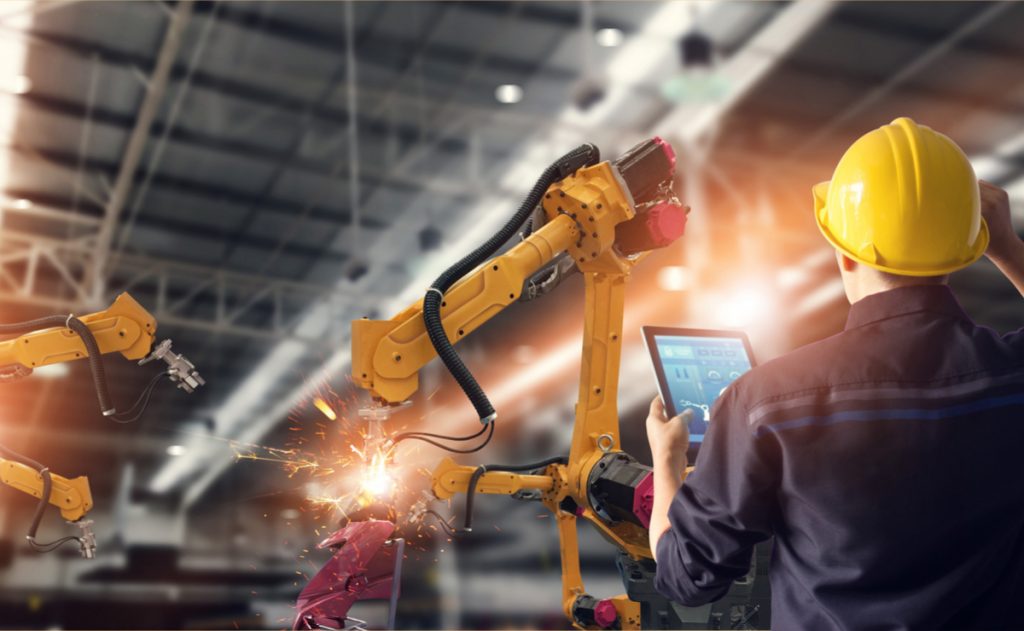The year 2018 is coming to an end. With each passing month, we have witnessed the impact of new and emerging technologies over the manufacturing industry. The hike in the implementation of technologies like IIoT and real-time data processing, the machines involved in manufacturing are providing essential and insightful data to enhance the productivity of industries. Currently, logical decision-making processes generally involve human intervention along with the multiple processors of numerous machines. Well, some of the brilliant minds in the industry thought and concluded with implementing Artificial Intelligence (AI) in order to empower their manufacturing business. But, the question arises, why is AI considered as the optimum empowerment tool to transform manufacturing business into “Smart manufacturing” business? According to the experts, AI will enable machines to detect the anomaly and other fluctuations without any human intervention. The technology will allow AI-driven machines with the capabilities to respond in real-time providing better and uninterrupted actionable insights. According to a recent survey by Infosys, the use of machine learning (ML) has captured 79% of industry operations in manufacturing and other high-tech sectors specifically as is the institutionalization of enterprise knowledge using AI (66%) and cognitive AI-led processes/tasks (60%). In the survey it was discovered that 66% of the companies want to automate manufacturing to increase productivity, 61% wants to minimize manual errors, 59% are willing to reduce costs, and 50% of the approached organizations wants to refocus people’s efforts on non-repetitive tasks that benefit from human intervention. Let’s have a look at to how the implementation of AI will impact manufacturing business.
Minimize Operation and Maintenance (O&M) Expenses
Artificial Intelligence as a service, smart sensors, and an interconnected machine network help organizations’ engineers to have effortless monitoring of the devices on the floor. As a result of this uninterrupted monitoring, floor managers and supervisors can predict the anomaly in the machine and rectify it before any major damage. This in return allows the stakeholders to save a substantial amount that was initially spent over repairs and replacements. The swift development of AI and associated technologies are bridging manufacturing industry with digital twin technology. AI provides the shop-floor managers with the capability to analyze the data collected by the sensors and provide insights that help them to detect anomalies that can lead to a major loss to the business.
By 2021, half of the large industrial companies will use digital twins, resulting in those organizations gaining a 10% improvement in effectiveness. – Gartner.
Supply Chain Management – Improved!
Today the majority of the organizations are implementing AI and ML enabled smart solutions in their factories so as to improve global supply chain management. Since modern supply chains generate an ample amount of helpful data, AI can help organizations to perceive and analyze the generated data efficiently. Also, the technology can form it into valuable fragments of information. Hence, it becomes easy to adjust to varying market situations. Let’s take an example of IBM’s Watson Supply Chain System which uses cognitive AI technology that helps the organizations to monitor the entire supply chain operations. This system collects and evaluates the data from multiple sources such as social media platforms, news feeds, reviews, and suggestions etc. Conclusively, implementing AI tools organizations can create a consistent ecosystem that enables an uninterrupted exchange of information. AI not only allows the system to sustain itself, but also improve the process in every aspect of supply chain management.
Consistent Quality Control
The manufacturing industry is experiencing AI-based quality assurance as for the new frontline domain these days. Today, the majority of the manufacturing organizations have initiated implementing the network built upon sensors and other smart devices to eliminate low-quality products. However, the AI-enabled systems provide continuous quality control over the entire manufacturing process. Rather than of depending on manual examining processes, manufacturers now use sensors and big data to find out faults with accurateness. This allows establishments to enhance the quality of low-quality items and avoid dumping them. It decreases the delay in exclusive production which remains to mound up in previous quality control methods. Hence, it may result in a decrease in the demand for human workers in quality control in coming times.
Better Human-Machine Interaction
The boom in AI-enabled smart solutions is reshaping the face of manufacturing industry that is uniting humans and machines and making them work coherently. With this advancement of emerging technologies, we humans can comfortably work with advanced and complex machines like robots and other equipment to create an agile manufacturing process. There may be opportunities where we shall have even smarter machines in near future which shall be capable enough to work independently with humans. These advanced machines may have virtually infinite applications which may improve efficiency and flexibility in factories and may be able to identify patterns and learn to amend their responses consequently.
Buyer-Centric Manufacturing
Considering the preferences and security of consumers’ interests, manufacturers today are emphasizing their focus on buyer-centric manufacturing as the demand for the customized products. AI-enabled technologies are enabling companies to build smart industrial processes to adapt the variable of demands of the consumers. This definitely needs a wide-range network that can connect consumers directly to the manufacturers. By connecting IoT with IIoT, this is fairly possible. The companies will be able to collect data from consumers and work upon the consumers’ demands. This will enhance the level of the manufacturing industry and enable them to match consumer expectations. When the production is based on the order, it will not only reduce manufacturing waste but also allow vigorous supply chains. Since the production lines will be rapidly associated with cost-efficient and new products, consumers and manufacturers both will have a win-win situation.
Conclusion:
AI is the strength and future of Industry 4.0. This technology constantly improves the quality of production and collect data from products and equipment in the field. This data serves as vital information that forms the foundation for product development and essential commercial decisions. In the total implementation of Artificial Intelligence is the roadmap for any manufacturing industry to transform into smart manufacturing industry.
To know more, you can download our Whitepapers.





























































